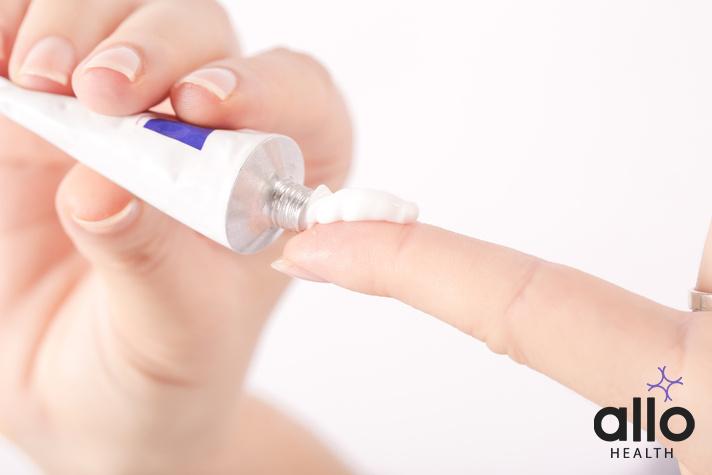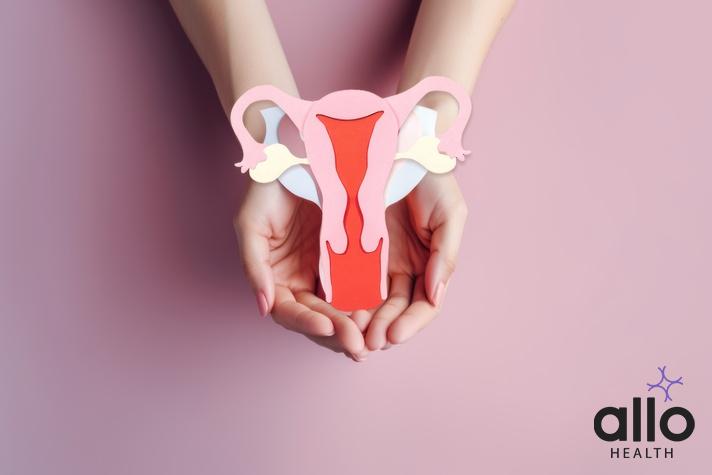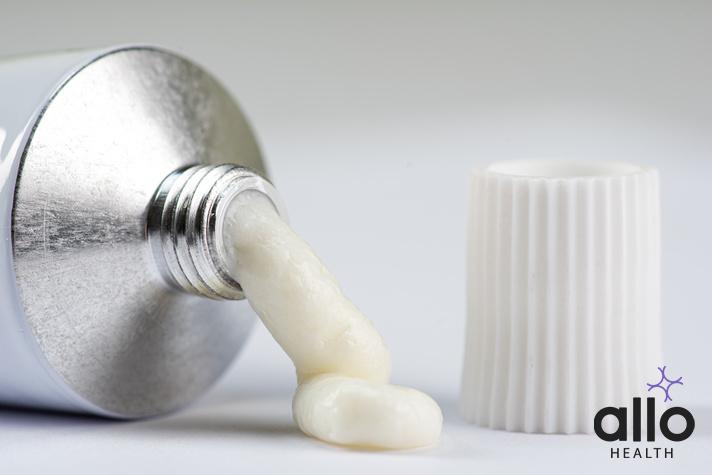Does Estrogen Cream Increase Libido?

Allo Health is dedicated to personalized well-being, offering support and trusted information tailored to individual health goals. The platform emphasizes human-generated content, led by a distinguished medical team of experts, including physicians and sexual health specialists. Their commitment to credibility involves rigorous fact-checking, authoritative research, and continuous updates to ensure accurate, up-to-date information. Allo Health's unique approach goes beyond conventional platforms, providing expert-led insights and a continuous commitment to excellence, with user feedback playing a crucial role in shaping the platform's authoritative voice.

Dr. Raj. R holds an undergraduate medical degree from the Philippines, and has a bachelors background in Psychology. His experience working in the field of urology further brought his interest forward in working towards his passion of understanding the science of attraction, intimacy, sex and relationships. A key motto he practices by remains unprejudiced and non-judgemental care.
Why This Was Upated?
Our experts continually monitor the health and wellness space, and we update our articles when new information became available.
Updated on 15 April, 2024
- Article was updated as part of our commitment to diversity, equity, and inclusion.

"The following blog article may discuss medical treatments and interventions. However, it is important to note that the information provided is for general educational purposes only and should not be considered as a substitute for professional medical advice, diagnosis, or treatment. Always seek the guidance of a qualified healthcare professional for personalized medical advice.
Book consultation
Medical treatments are complex and should be tailored to individual circumstances. The information presented in this blog may not be applicable to everyone, as each person's medical condition, history, and needs are unique. Only a qualified healthcare professional can evaluate your specific medical situation, consider relevant factors, and provide appropriate recommendations for diagnosis, treatment options, and monitoring.
It is crucial to note that self-diagnosis, self-medication, or relying solely on the information provided in this blog for treatment decisions can have serious health consequences. "
Estrogen cream is often discussed in relation to sexual health, especially for women experiencing changes in their sexual function. This article explores whether estrogen cream can increase libido, focusing on its effects on various aspects of sexual health and hormonal balance.
Role of Libido in Sexual Health
Libido, often referred to as sexual desire, plays a crucial role in overall sexual health and wellbeing. Here are some key points highlighting its importance:
- Indicator of Physical Health: Libido is often a reflection of one’s general physical health. Changes in libido can signal various health conditions, ranging from hormonal imbalances to chronic illnesses.
- Link to Emotional and Psychological Wellbeing: A healthy libido is closely tied to emotional and mental health. It can enhance self-esteem, reduce stress, and promote overall happiness.
- Maintain Relationship Satisfaction: For many people, a healthy sex drive is important for maintaining intimacy and satisfaction in romantic relationships. It can strengthen emotional bonds and enhance the quality of the relationship.
- Improve Reproductive Health: While not solely important for reproduction, libido does play a role in reproductive health by motivating sexual activity, which can be important for couples trying to conceive.
- A Part of Personal Identity and Expression: Sexual desire is a part of personal identity and expression. A healthy libido allows individuals to explore and express their sexuality in a way that is fulfilling for them.
- Indication of Hormonal Balance: Libido levels can reflect the balance of hormones in the body, such as estrogen and testosterone. Changes in libido can indicate fluctuations or imbalances in these hormones.
- Impact on Life Quality: A fulfilling sex life, to which libido contributes significantly, can improve overall life quality, including physical, emotional, and mental aspects.
Understanding and maintaining a healthy libido is essential for sexual health. It’s important to note that what constitutes a healthy libido can vary greatly among individuals, and fluctuations are normal. However, significant changes or concerns about libido should be discussed with a healthcare provider, as they can provide insights into overall health and wellbeing.
What is Estrogen Cream?
Estrogen cream is a topical medication primarily used to treat symptoms associated with estrogen deficiency, particularly in postmenopausal women. It falls under the category of estrogen hormone therapy, designed to replenish estrogen levels, which naturally decline during menopause.
- Affect Estrogen Levels and Sexual Health: Estrogen cream directly impacts estrogen levels in the body. Estrogen is crucial for maintaining vaginal tissue health, sexual arousal, and overall sexual function.
- Treatment for Vaginal Dryness: One of the primary uses of vaginal estrogen creams is to alleviate vaginal dryness, a common symptom of the syndrome of menopause. This symptom can lead to discomfort during sexual activity, impacting sexual desire and function.
- Addresses Sexual Dysfunction: By improving symptoms like dryness and discomfort, estrogen creams can indirectly affect sexual desire and arousal in women, especially those experiencing menopausal changes.
- Application in Postmenopausal Women: Estrogen cream is particularly beneficial for postmenopausal women, who often experience a significant drop in estrogen levels. This drop can lead to various symptoms of menopause, including sexual dysfunction.
- Estrogen Therapy Options: Apart from vaginal creams, other forms of estrogen therapy include systemic estrogen, which is administered orally or through skin patches, and estrogen birth control, which is used by premenopausal women.
- Estrogen and Female Hormones: Estrogen is a key female hormone, integral to sexual development and health. Estrogen cream focuses on restoring a healthy balance of this hormone to improve sexual health conditions.
- Balancing with Testosterone Levels: In some cases, healthcare providers may consider the role of testosterone levels in conjunction with estrogen therapy. Testosterone supplementation can sometimes be used alongside estrogen therapy to address sexual desire disorders.
- Medical Considerations: Before using estrogen cream, it’s important to consult with a health provider. They can assess the medical condition, considering factors like the history of breast cancer, cardiovascular health, and other health conditions.
- Clinical Trials and Effectiveness: Various clinical trials have studied the effectiveness of estrogens in treating menopausal symptoms. These studies often explore the benefits of estrogen replacement, including the effectiveness of vaginal estrogen creams.
- Additional Health Benefits and Risks: While focusing on improving sexual function and alleviating menopausal symptoms, it’s also crucial to consider the long-term risks and benefits of estrogen hormone therapy, including its impact on overall health and well-being.
Estrogen cream is a targeted treatment option designed to address specific symptoms of estrogen deficiency, particularly in menopausal women, impacting sexual health and function.
Can Estrogen Cream Increase Libido?

Estrogen cream can potentially increase libido through several mechanisms, primarily by addressing the hormonal imbalances and physical symptoms that contribute to reduced sexual desire, especially in postmenopausal women. Here’s how it works:
- Increase Sexual Desire and Arousal: Estrogen levels are directly linked to sexual desire and arousal in women. Adequate levels of estrogen contribute to maintaining a healthy sex drive and sexual responsiveness.
- Improve Vaginal Health: Estrogen is essential for the health of vaginal tissue. It helps in maintaining vaginal lubrication and elasticity, which are important for comfortable and enjoyable sexual experiences. Vaginal dryness, often a result of low estrogen levels, particularly in postmenopausal and menopausal women, can lead to discomfort during sex and a subsequent decrease in libido.
- Effect on Mood and Well-being: Estrogen influences mood and overall well-being, which in turn can affect sexual desire. Fluctuations in estrogen levels can lead to mood swings and changes in sexual interest.
- Treat Hormonal Imbalance and Sexual Dysfunction: Imbalances in estrogen levels, whether due to menopause, medical conditions, or estrogen hormone therapy (including estrogen birth control), can lead to sexual dysfunction. This might manifest as hypoactive sexual desire disorder, a condition characterized by a persistent lack of interest in sex.
- Provide Psychological Benefits: Dealing with symptoms of menopause like vaginal dryness can be stressful and affect a woman’s self-esteem and sexual identity. By alleviating these symptoms, estrogen cream can also have psychological benefits, leading to an improved mood and increased interest in sexual activity.
- Improve Overall Sexual Function: Estrogen is also linked with the overall sexual function. By improving the estrogen levels locally, estrogen creams might contribute to a more satisfying sexual experience, which can in turn lead to an increased desire for sexual activity.
It’s important to note that the effectiveness of estrogen cream in increasing libido can vary greatly among individuals. Factors like overall health, the presence of other medical conditions, and individual hormonal profiles play a significant role.
Additionally, estrogen cream primarily addresses local symptoms and may not be sufficient for all cases of decreased libido, especially those linked to systemic hormonal imbalances. For a comprehensive treatment, consulting with a healthcare provider is crucial, as they can recommend the most appropriate therapy based on individual health needs.
Comparing Estrogen Cream with Other Estrogen Therapies

When considering treatments for symptoms related to the syndrome of menopause, especially regarding sexual function, it’s important to understand the differences between various estrogen therapies, including estrogen creams and systemic estrogen options.
Local vs. Systemic Application
- Estrogen Cream: Primarily used to treat localized symptoms like vaginal dryness, improving vaginal tissue health and sexual comfort. It directly targets vaginal estrogen levels.
- Systemic Estrogen Therapy: Involves increasing estrogen levels throughout the body, affecting overall estrogen hormone therapy. It’s used to address a broader range of menopausal symptoms, including hot flashes and bone health.
Impact on Sexual Function and Libido
- Vaginal Estrogen Creams: Directly alleviate vaginal dryness and discomfort, which can enhance sexual arousal and comfort in postmenopausal and menopausal women. Their effect on increasing libido is more indirect and focused on alleviating discomfort.
- Systemic Estrogen Therapy: Can have a more pronounced impact on overall sexual desire and function due to its broader influence on female hormones and sexual development.
Influence on Testosterone Levels and Sexual Desire
- Estrogen Cream: Does not directly affect testosterone levels, which also play a significant role in sexual desire and sexual dysfunction.
- Systemic Therapy: Can potentially influence testosterone levels, as it affects the overall hormonal balance, including the adrenal glands’ production of sex hormones.
Risks and Side Effects
- Estrogen Cream: Lower risk of systemic side effects, as the amount of estrogen absorbed into the bloodstream is minimal. Reduced risk of breast cancer compared to systemic therapy.
- Systemic Estrogen Therapy: Associated with higher risks, including cardiovascular health concerns and an increased risk of breast cancer. Long-term risks need careful consideration.
Effectiveness for Other Menopausal Symptoms
- Vaginal Creams: Highly effective for localized symptoms like vaginal dryness and discomfort, but not effective for other menopausal symptoms.
- Systemic Therapy: More effective for a broader range of symptoms, including hot flashes, osteoporosis, and overall estrogen deficiency.
Use in Different Stages of Menopause
- Estrogen Cream: Commonly recommended for postmenopausal women and those experiencing vaginal symptoms of menopause.
- Systemic Estrogen: Can be used by premenopausal women experiencing early menopause symptoms, as well as postmenopausal women.
Complementary Treatments
- Estrogen Cream: Often used alongside other treatments, like non-estrogen medication, nutritional supplements for libido, or vaginal lubrication products.
- Systemic Therapy: May be used in combination with other hormone therapies, including testosterone supplementation, especially in cases of hypoactive sexual desire disorder.
Conclusion
Estrogen creams can be an effective option for treating certain symptoms of menopause that affect sexual health, such as vaginal dryness and discomfort. However, the impact on libido is complex and varies among individuals. It’s essential to consider all treatment options, including the potential benefits and risks, in consultation with a healthcare provider. Understanding the intricate balance of female hormones like estrogen and testosterone is key to addressing sexual desire and function effectively.
Most Asked Questions
-
Can using estrogen cream improve my sex drive?
Yes, it might. Estrogen cream mainly helps with vaginal dryness, which is a common concern for postmenopausal women. By relieving dryness and discomfort, it can indirectly enhance your sexual experience and potentially increase your libido.
-
Is estrogen cream the only option for low libido in women?
No, it’s not the only option. There are various treatments available, including testosterone therapy and non-hormonal alternatives. It’s important to discuss with your healthcare provider to find the best solution tailored to your needs.
-
Are there any risks associated with using estrogen cream?
As with any medical treatment, there are potential risks. Long-term use of estrogen products might be linked to certain health risks like breast cancer. It’s crucial to consult your health provider and understand both the benefits and risks before starting any hormonal treatment.
-
How does estrogen cream work exactly?
Estrogen cream is applied directly to the vaginal area. It works by providing localized estrogen to the vaginal tissue, helping to alleviate symptoms of dryness and discomfort. This can lead to improved sexual arousal and comfort during intercourse, which may indirectly boost your libido.






































